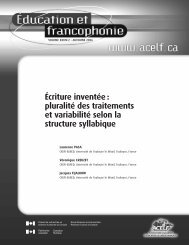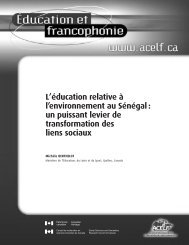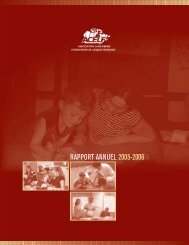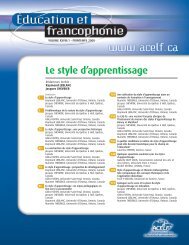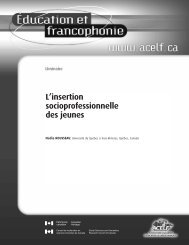Numéro complet (pdf) - acelf
Numéro complet (pdf) - acelf
Numéro complet (pdf) - acelf
You also want an ePaper? Increase the reach of your titles
YUMPU automatically turns print PDFs into web optimized ePapers that Google loves.
Au-delà des renforcements intrinsèques :<br />
les relations émotionnelles des enseignants avec leurs élèves<br />
que les émotions doivent être reconnues et intégrées. De plus, la dimension affective<br />
influence l’enseignement dispensé, sa planification et sa structuration. Enfin, l’étude<br />
met en lumière des différences significatives dans la place faite aux émotions entre le<br />
primaire et le secondaire.<br />
ABSTRACT<br />
Au-delà des renforcements intrinsèques :<br />
les relations émotionnelles des enseignants avec leurs élèves<br />
Andy HARGREAVES, professeur, directeur du ICEC<br />
International Centre for Educational Change<br />
Ontario Institute for Studies in Education<br />
University of Toronto (Ontario) Canada<br />
Teachers do not work for the money or for the vacation time. In spite of all the<br />
constraints of the teaching profession, when all is said and done, teachers work for<br />
the students. For teachers, the children and the life in class are the most important<br />
rewards, and at times they may be the only reward. This finding is supported by this<br />
research paper. More specifically, the author examines the teaching relationship as it<br />
is understood by teachers, and what primary and secondary school teachers gain<br />
from it. The emotions associated with and produced by teaching, as well as their<br />
effects on teaching, are at the centre of this study. The research is based on three surveys<br />
carried out by means of interviews with primary and secondary school teachers<br />
in Ontario. The analysis shows that teachers place a high value on the emotional relationship<br />
with their students and the attachment felt by both parties; they consider<br />
that an empathic understanding on the part of the students is an essential ingredient<br />
of good teaching, and that emotions should be recognized and integrated. Moreover,<br />
the emotional dimension has an influence on teaching, as well as its planning and<br />
structure. Finally, the study examines the significant differences between the importance<br />
given to emotions at the primary and secondary levels.<br />
volume XXIX, printemps 2001<br />
176<br />
www.<strong>acelf</strong>.ca





